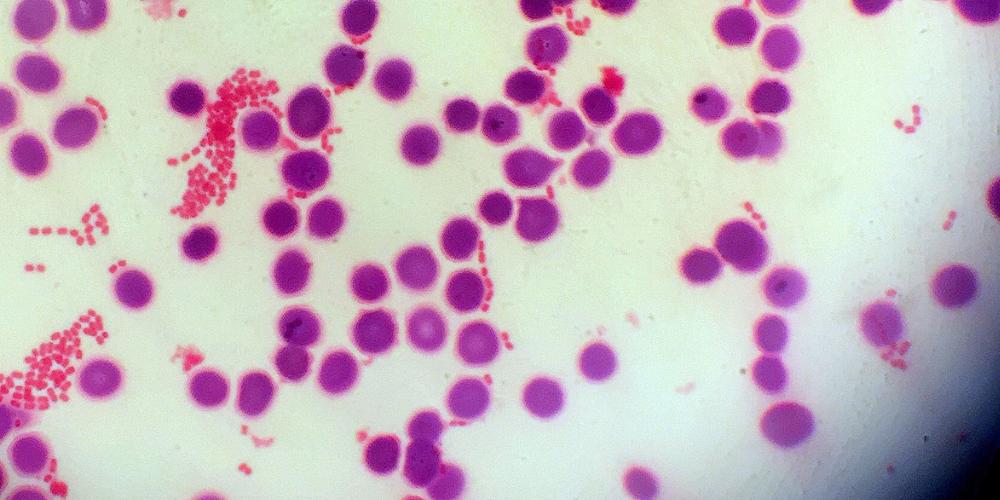Putting Our Knowledge And Experience To Work
Home » Medical Malpractice » Sepsis
Sepsis Malpractice Attorneys in Kentucky & Ohio

Sepsis is a serious, life-threatening infection, and delays in recognizing and treating sepsis and septic shock may result in permanent injury or death. If you or a loved one has suffered sepsis, you need an experienced and knowledgeable medical malpractice attorney who can assert your rights and help you receive the compensation you are entitled to as permitted by law.
At The Lawrence Firm, PSC, our attorneys understand the complex nature of sepsis and the potential lifelong implications of the infection. Our team of attorneys is experienced in cases involving sepsis and other medical malpractice claims, and we offer collaborative and effective legal services throughout Kentucky and Ohio. For more information or to speak with one of our Covington medical malpractice attorneys today, give us a call at 800-698-4054.
What is Sepsis?
A sepsis infection, sometimes known as septicemia, is a bacterial infection in the bloodstream. This condition occurs when the immune system’s response to an infection essentially poisons its own tissues. In general, when the body faces an infection, certain chemicals are released into the bloodstream in an attempt to rid the body of dangerous bacteria and other germs. With sepsis, these chemicals seemingly turn on the body at attack the internal organs, causing inflammation and potentially severe organ damage. The widespread inflammation may lead to clots which reduce the flow of blood to the body’s extremities and internal organs, diminishing them of the oxygen and nutrients they need to properly survive and function.
What Causes Sepsis?
Sepsis is almost always caused by bacterial infections but can result from other infections, as well. In addition to bacteria, sepsis may originate from any place in your body where viruses, parasites, or fungi enter. This may be something as obvious as staph bacteria entering open wounds or even something as seemingly minuscule as a hangnail. Sepsis may also be caused by a bone infection called osteomyelitis.
In cases of medical malpractice, dangerous bacteria can enter the body through IV lines, surgical incisions, urine catheters, and bedsores in hospitalized patients.

What is Septic Shock?
In severe sepsis cases, the infection may lead to a dangerous drop in blood pressure that is known as “septic shock.” If not treated efficiently, septic shock can very quickly result in complete organ failure of essential organs such as your kidneys, liver, and lungs, which can be fatal.
Signs and Symptoms of Sepsis
Sepsis can originate in several different parts of the body and for a variety of reasons. As such, there are a number of signs and symptoms associated with sepsis. The first signs of sepsis are typically confusion and rapid breathing. Other physical indications of sepsis may include:
- Fever
- Sweating
- Clammy skin
- Chills
- Extremely low body temperature
- Fatigue
- Weakness of the body
- Rapid heartbeat
- Diarrhea
- Nausea or vomiting
- Severe discomfort or pain
- Discoloration in the skin
- Decreased urine output
Your doctor will likely conduct tests such as a CT scan, X-ray, or ultrasound to spot signs of an infection. Your doctor may also run lab work, such as urine and blood tests, to search for signs of:
- An abnormally high or low white blood cell count
- A low number of platelets in the bloodstream
- Low blood pressure
- Acidosis (excessive amounts of acid in the body)
- A lack of oxygen in the blood
- Bacteria in the blood
- Bodily fluids in the blood
- Uneven electrolyte balance
- Kidney or liver problems
- Problems with how your blood clots
In order to confirm a sepsis diagnosis, a change in mental status, a respiratory rate above or equal to 22 breaths per minute, and a systolic blood pressure below or equal to 100 millimeters of mercury must all be present.
Sepsis Risks Factors
There are a number of factors that can increase a patient’s risk of developing sepsis, some of which include:
- Old age
- Infancy
- Diseases and medical conditions
- Diabetes, appendicitis, meningitis, cirrhosis, pneumonia, UTI, etc.
- Chronic kidney or liver disease
- Pregnancy
- Use of invasive devices such as catheters or breathing tubes
- Compromised immune system
- Previous use of antibiotics or corticosteroids
- Recent surgery and/or long hospital stays
How is Sepsis Treated?
If you contract sepsis, your will most likely need to be kept in the critical care unit of the hospital (ICU). Your medical team will seek to eliminate the infection, keep your organs functioning, and keep your blood pressure under control. Extra oxygen and IV fluids can assist with this.
Once your doctor has figured out what’s causing your sepsis, he or she can prescribe medication that targets that particular bacterium. Broad-spectrum antibiotics may be able to combat bacterial infections early on. Doctors also frequently prescribe drugs that narrow the blood vessels, called vasopressors, to improve blood pressure. You may be prescribed corticosteroids to combat inflammation or insulin to keep your blood sugar under control, as well.
In severe sepsis and septic shock cases, you may require further treatment, such as renal (kidney) dialysis or help from a breathing machine. Alternatively, surgery may be required to drain or clear out an infection.

Sepsis Shock Recovery
A sepsis infection often leads to prolonged hospitalization and, if left untreated, may result in permanent injury or death. However, when treated properly, complete recovery for cases of mild sepsis is achievable at a relatively quicker rate. On average, it takes three to ten days to recover from this disease, depending on the response time and form of treatment.
For cases of severe sepsis, patients typically need prompt treatment in a critical care unit for upwards of a month. Recovery is possible, but it will take much longer than mild sepsis. The time it takes for a patient to recover from severe sepsis varies depending on the number of organs affected by the infection and the level of organ failure.
Unfortunately, the chance of survival for those who experience septic shock only sits at about 50%. Complete recovery from septic shock would necessitate the termination of all supplementary treatments, which is rarely achievable. Because of the high likelihood of irreversible organ failure after septic shock, a patient with a pre-existing chronic condition who survives septic shock is likely to require lifetime supportive treatment and therapy.
Sepsis Malpractice Lawsuits
There is a critical time window for which sepsis must be treated, and quick, proper medical treatment can make all the difference in the patient’s prognosis. Unfortunately, there are many cases where a patient shows clear signs and symptoms of sepsis and/or septic shock and is misdiagnosed, improperly treated, or is simply not treated promptly enough. While the majority of people with mild sepsis who are treated early on recover, around half of all patients who develop severe sepsis and/or fall victim to septic shock die. The other half is usually left with serious, long-term damage. In such circumstances where proper treatment is not administered, the patient or their family may have a valid medical malpractice claim and file a medical malpractice lawsuit as a result.
Sepsis Malpractice Settlements
Injury victims and their families may face a variety of unexpected adversities as a result of medical providers misdiagnosing sepsis and untreated sepsis or septic shock. These challenges that arise from medical negligence include an array of physical, emotional, and financial obstacles. If you or a loved one has suffered a significant, irreversible disability or wrongful death as a result of a failure to identify or treat sepsis or septic shock, you may be entitled to compensation. Damages that may be available for sepsis malpractice settlements include, but are not limited to:
- Current and future medical bills
- Current and future lost income
- Long-term treatment/care expenses
- Long-term disability
- Rehabilitation expenses
- Pain and suffering
- Loss of enjoyment of life
- Loss of consortium
- Loss of household services
- Burial and funeral expenses
During these difficult times, it is crucial to remember that submitting a medical malpractice claim and initiating legal action to obtain compensation are both subject to time constraints. In Ohio, the statute of limitations for filing a claim for medical malpractice is generally one year, with some exceptions. In Kentucky, the statute of limitations is also generally one year but may be extended to two years if the patient died as a result of sepsis.
As such, it is important that you seek the legal advice of a qualified attorney who can help you navigate your medical malpractice case. At The Lawrence Firm, our Cincinnati and Covington medical malpractice attorneys handle personal injury, wrongful death, and medical malpractice cases of all kinds, including situations of undetected sepsis, misdiagnosed sepsis, and untreated septic shock. Call our experienced medical malpractice law firm at 800-698-4054 as soon as possible to schedule your free consultation and learn more about your sepsis malpractice settlements options. Once the attorney-client relationship is established, we can discuss your case in detail and explore the legal options available to you.
Contact The Medical Malpractice Lawyers at The Lawrence Firm Today
If you or a loved one has suffered as a result of sepsis caused by or unappreciated by a medical professional, seek the legal advice of dedicated medical malpractice attorneys who can help you obtain the compensation you deserve. At The Lawrence Firm, PSC, our legal team handles a variety of medical malpractice lawsuits, including those involving sepsis. We are an Ohio and Kentucky law firm dedicated to helping victims of misdiagnosed or undiagnosed sepsis and their families recover damages for medical expenses, pain and suffering, and other losses. With more than 50 years of experience serving clients injured by sepsis or other forms of medical malpractice, we know what it takes to achieve the best possible outcome for your case.
You can contact us by calling toll-free at 800-698-4054 or by filling out our online contact form to schedule your initial free consultation with an experienced attorney at The Lawrence Firm, PSC today.
Practice Areas
You Pay No Fees Unless We Win!
We are happy to offer a free consultation to evaluate your case. If you hire us as your legal counsel, we will represent you on a contingency-fee basis. You will pay no attorneys’ fees unless we recover financial damages.
